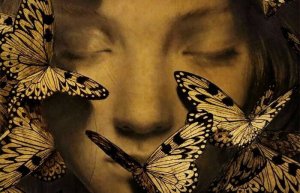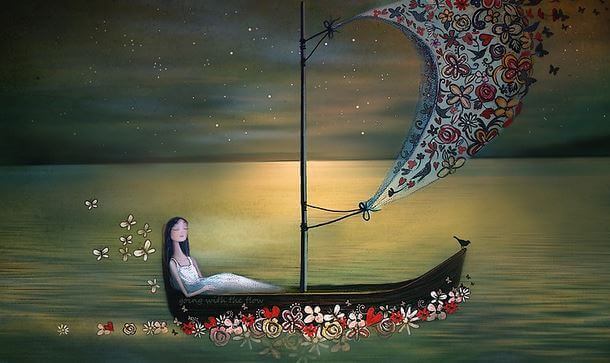Death Is a Symptom of Having Lived

It is often taboo to talk about death in our society, since it is a subject that causes rejection, fear, and anguish in many people. However, death is the very essence of life. It is the truth we must all face sooner or later and that is constantly present in our existence.
The way we experience death depends on the beliefs we have about it, this understanding that we develop says a lot about ourselves and how we situate ourselves on our own path, be it through fear, learning, eternity, punishment, reward, and even the belief that there will be nothing and dying puts an end to everything.
“Death is something we shouldn’t fear because while we are, death isn’t, and when death is, we aren’t.”
-Antonio Machado-
The mystery of death
What happens when it comes our time to die has been a mystery in all cultures. We’ve constructed beliefs deeply rooted in religion, rituals, spirituality, philosophy, etc. Science has conducted many studies in this respect, leaving behind many unknowns.
Is there life after death? We cling to the idea that there is something, an energy that transcends us, be this in the form of reincarnation or living in another dimension. We do not really know what happens, though it is true, as Immanuel Kant said, that every individual has a need to believe in something to give meaning to their existence.
What happens to us when someone close to us dies? The idea of losing a loved terrifies us. For a few days, we are aware of how fleeting everything is, that nothing is permanent. And we run right into reality, realizing how absurd most of our worries are.

“Pale death beats equally at the poor man’s gate and at the palaces of kings.”
-Horace-
Being aware of the inevitable
The idea that we are going to die is valuable when it helps us reflect on the value of life. Being aware of the inevitable implies a maturing process in which we find ourselves.
We do not know what will happen when it comes, despite our faith and beliefs. What we do know for sure is that a time will come when life as we know it will be transformed. Being aware of this moment makes us see life more realistically, shooting us at point blank range to the present moment.
“Death is a life lived. Life is an approaching death.”
-Jorge Luis Borges-
By being aware, we also give rise to fears about that unknown end, even though this step helps us stand face to face with them so that they do not rule us without our knowing it. Instead, we are aware of it so that we can make our own decisions. If we pay attention to the symbolism of death, we will understand its meaning of renewal, of a constant creation of energy.
Is death different from life?
What we do know is that dying is a part of life, in fact, it is one of the few things that we can claim with certainty. We believe that dying puts an end to everything we know. This is why we try to build bridges between the known and the unknown based on our own beliefs.
One of the keys lies in the teachings about this subject left by those people who are about to die. When they are asked about their lives, they remind us that the only thing we have is what we are experiencing in this precise moment and that we must do everything possible to experience it to the fullest.
The famous psychiatrist Carl Gustav Jung believed that when people live with fear of dying, they are frozen with this fear, dying before their time, as they are not living.
“For the soul, death is as important as birth, and like this, an integral element of life. We do not have the right to ask the psychologist what finally happens when our consciousness separates from our bodies. Whatever theoretical position you adapt, it will go hopelessly beyond the limits of its scientific rival.”
-Carl Gustav Jung-
As we can see in this video, Jung offers us the idea that in the face of death, life acts as if it would continue.
It is often taboo to talk about death in our society, since it is a subject that causes rejection, fear, and anguish in many people. However, death is the very essence of life. It is the truth we must all face sooner or later and that is constantly present in our existence.
The way we experience death depends on the beliefs we have about it, this understanding that we develop says a lot about ourselves and how we situate ourselves on our own path, be it through fear, learning, eternity, punishment, reward, and even the belief that there will be nothing and dying puts an end to everything.
“Death is something we shouldn’t fear because while we are, death isn’t, and when death is, we aren’t.”
-Antonio Machado-
The mystery of death
What happens when it comes our time to die has been a mystery in all cultures. We’ve constructed beliefs deeply rooted in religion, rituals, spirituality, philosophy, etc. Science has conducted many studies in this respect, leaving behind many unknowns.
Is there life after death? We cling to the idea that there is something, an energy that transcends us, be this in the form of reincarnation or living in another dimension. We do not really know what happens, though it is true, as Immanuel Kant said, that every individual has a need to believe in something to give meaning to their existence.
What happens to us when someone close to us dies? The idea of losing a loved terrifies us. For a few days, we are aware of how fleeting everything is, that nothing is permanent. And we run right into reality, realizing how absurd most of our worries are.

“Pale death beats equally at the poor man’s gate and at the palaces of kings.”
-Horace-
Being aware of the inevitable
The idea that we are going to die is valuable when it helps us reflect on the value of life. Being aware of the inevitable implies a maturing process in which we find ourselves.
We do not know what will happen when it comes, despite our faith and beliefs. What we do know for sure is that a time will come when life as we know it will be transformed. Being aware of this moment makes us see life more realistically, shooting us at point blank range to the present moment.
“Death is a life lived. Life is an approaching death.”
-Jorge Luis Borges-
By being aware, we also give rise to fears about that unknown end, even though this step helps us stand face to face with them so that they do not rule us without our knowing it. Instead, we are aware of it so that we can make our own decisions. If we pay attention to the symbolism of death, we will understand its meaning of renewal, of a constant creation of energy.
Is death different from life?
What we do know is that dying is a part of life, in fact, it is one of the few things that we can claim with certainty. We believe that dying puts an end to everything we know. This is why we try to build bridges between the known and the unknown based on our own beliefs.
One of the keys lies in the teachings about this subject left by those people who are about to die. When they are asked about their lives, they remind us that the only thing we have is what we are experiencing in this precise moment and that we must do everything possible to experience it to the fullest.
The famous psychiatrist Carl Gustav Jung believed that when people live with fear of dying, they are frozen with this fear, dying before their time, as they are not living.
“For the soul, death is as important as birth, and like this, an integral element of life. We do not have the right to ask the psychologist what finally happens when our consciousness separates from our bodies. Whatever theoretical position you adapt, it will go hopelessly beyond the limits of its scientific rival.”
-Carl Gustav Jung-
As we can see in this video, Jung offers us the idea that in the face of death, life acts as if it would continue.
This text is provided for informational purposes only and does not replace consultation with a professional. If in doubt, consult your specialist.







